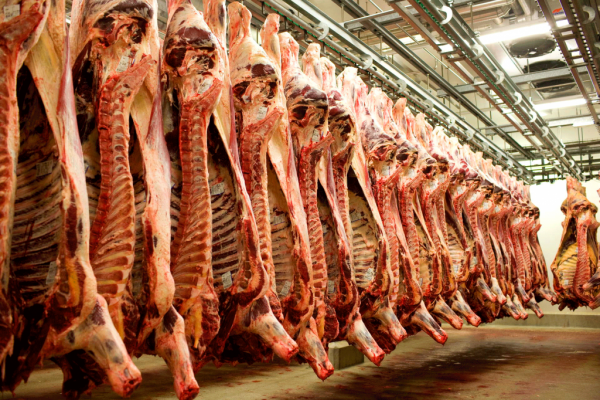
“AND a million PD’s later, Japie Jackson is still standing, ready for one more PD... never losing the threads of a story that started almost 100 years back in the frontier town of Masvingo.” Cue to the legendary Dr Japie Jackson reaching for a tissue. And no wonder John Crawford’s speech was a powerful mix of appreciation, humour and story-telling prowess. It was a poignant ode to Japie Jackson’s lifetime of dedicated service to his profession, lifelong relationship with Zimbabwe’s commercial beef sector and an unspoken nod to the mortality of a man whose career epitomises longevity and resilience. It was incredible to watch, and that to me was the crowning moment of two and half days packed with ideas, relationships and organisation.
Welcome to Zim Beef School 2022!
Held on the outskirts of Bulawayo in September this year, this was the first Beef School held physically since 2020 when Covid-19 disrupted physical gatherings. It was also the first event to be organised exclusively by Zimbabwe Herd Book without their South African counterparts, and understandably the event had an experimental air to it.VBut man oh man, it was spectacularly successful.
For one, the event was oversubscribed. A record 160 people attended, with a good number turned away because of the limitations of the venue. There was a good racial mix too: more than half the attendees were black farmers, entrepreneurs, value chain actors and government service providers.
The event still retained an international flavour though, with a handful of in-person speakers from South Africa and Kenya, and more speakers joining virtually from SA, US and Germany. And the content was diverse too - from finance, cryptocurrency, genetic profiling, veld management, disease updates and beef marketing in Zimbabwe.
I found Erasmus Bhunu and Fradreck Chinhenga’s talk on agricultural finance in modern day Zimbabwe very illuminating. They highlighted some critical reasons for failure to secure bank loans as: failure to clearly articulate borrowing requirements; poorly structured farming operations; unexplained losses and poor financial records; poor management and marketing; absence of lucrative markets and…character.
“Business people get funding for who they are; banks have a long memory!” Chinhenga emphasised that those that are likely to get funded demonstrate knowledge of their chosen business; demonstrate commitment by putting some of their own money in the business; demonstrate their vision by the order in their operations and make a compelling business case.
On the whole, I saw a learning programme geared towards the renewal of the beef sector in Zimbabwe. The programme sought to exploit what we have already learned in the past while exploring new ideas. For example, Mario Beffa shared insights from a long-term study on genotype and environment interaction to draw lessons on matching cow size to environment to maximise fertility; Doug Bruce made a presentation on the significance of body condition scoring as a management tool; Kevin Kirkman and Richard Fynn presented reflective insights on veld management from the region and introduced us to the “beer can principle” for managing veld.
- School of sport: Where is school sport going?
- Celebrating Zim beef sector
- Mukhuhlani withdraws as New Zealand's Barclay re-elected ICC chairman
- Gems draw powerhouse Australia
Keep Reading
Basically the idea is that peak veld productivity occurs when the veld is not too rank (not taller than an upright beer can) and when not too overgrazed (about the height of a beer can lying on its side). Nyika made a presentation on the cattle disease situation in the country, highlighting problems, issues and opportunities for the beef industry from an animal health perspective.
New ideas were also explored, based on the assumption that technology allows the beef sector to be more efficient. There was a presentation from New Zealand on better animal selection using advanced genomic evaluation techniques; new techniques in cattle supplementation and feeding developed in SA; and an exploration of the potential of blockchain in agriculture.
There were slots on the programme for sponsors; for the Brahman Breeders Association to exhibit a couple of their well-sculptured bovine specimens. There was space for Zimbabwe Herd Book Awards; time for John Crawford to deliver a celebratory tribute to Japie Jackson for his contribution to Zimbabwe’s commercial beef sector; and even space for practical deborning of a beef quarter which we enjoyed for lunch!
And always, there was the ubiquitous Mario Beffa. Mario harried and hurried the troops, exhorting everyone to “let’s get on with the show”, infusing the proceedings with his energy and passion…the glue that made everything tick. Mario highlighted the need to revisit the meat classification and grading system in Zimbabwe to simplify it and remove in the classification criteria an inherent bias against small framed breeds such as the Mashona. Mario challenged those present to get organised so they can achieve countervailing power to advocate for the beef industry interests in the country. Mario cheerily waved everyone away with “safe journey and meet you next year!”
Bring on Beef School 2023, Dr.Beffa, we can’t wait. And (wink, wink), more beef on the menu in 2023!
Magwiroto is a lecturer at the University of Zimbabwe, Department of Community and Social Development, Faculty of Social and Behavioural Sciences.






